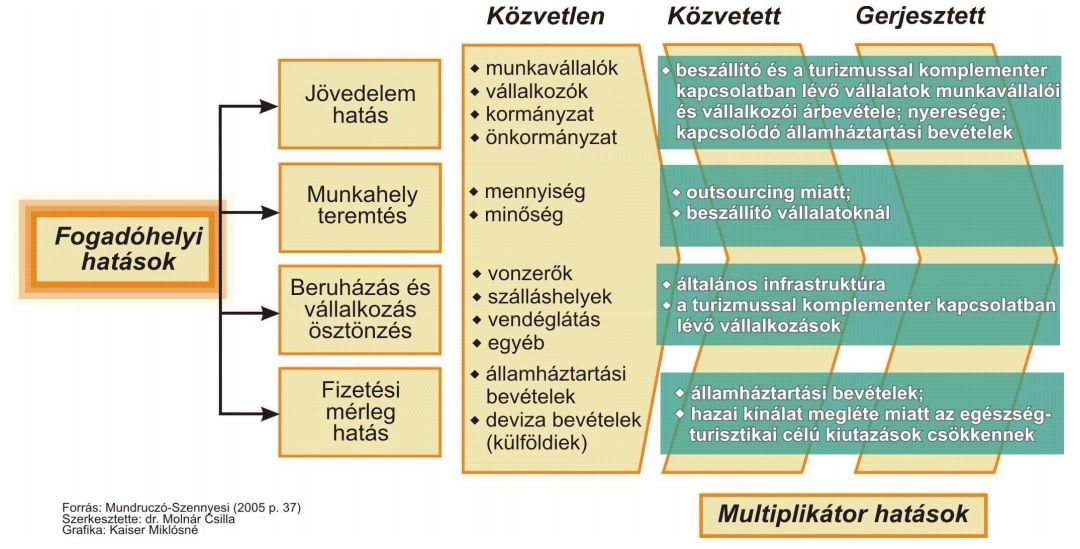Specific economic role of health tourism
In the opinion of Hustiné Béres K. (2011) the economic role of health tourism can be investigated using different approaches. First of all, health tourism - similar to other economic branches - influences the economy of places (resorts, towns, regions, countries), where it receives guests and patients. The effect of health tourism destinations on the economy can be examined from various points of view.
a) By the main areas of economic impact: income, employment/creation of jobs, impact on the administration of public revenue, stimulation of investment, support of enterprises, impact on the balance of payments. (Figure 3).
b) By destination types: national, regional, local impact.
c) By impact features (levels): indirect, direct, generated (multiplicator).
d) By income owners: entrepreneur, employee, local government, state budget
All the above factors – except for the impact on the balance of payments – can be investigeted from the point of view of macroeconomics and microeconomics as well.
The economical operation of health tourism centres –compared with other tourist destinations – is based on the following:
- Services in both medicinal and wellness tourism are not dependent on weather and seasonal changes.
- The average length of stay is longer ( 8-10 days) than in other branches of tourism (3-5 days) (Hojcska Á- Szabó Z. 2010).
- Creates jobs locally for the whole year for qualified work force.
- Per unit costs are 1/3 higher than in other branches of tourism.
- In health tourism guests tend to spend more, a situation, which generates the creation of complementary services. This way the given destination can be used in many ways. Quoting an example from the health tourism of Hungary: each 100 forint income generates 167 forints of additional production, while every 100 job creates 214 new jobs for the national economy. (Hegedűs V. 2006).

Figure 3. The economic impact of health tourism. Source: Molnár Cs. 2011. (p. 31)
Local impact /income, creation of jobs, stimulation of investment and entrepreneurship, balance of payments, employees, entrepreneurs, government, local government, quantity, quality, forces of attraction, accomodation, catering, other, revenue, income in foreign currency, income of suppliers and other tourism-related businesses, outsourcing, suppliers, general infrastructure, tourism-related businesses, state budgetary income, reduced number of health tourists going abroad.
Health tourism is one of the most significant export products of the country. It is one of its characteristic features that it is not the service provider who gets the product to the buyer (tourist), but it is the latter person who travels, thus saving on transport costs. During his or her stay at the chosen destination the tourist purchases products and services, which would not be exportable otherwise. (Molnár Cs. 2011). It is not by chance that products of health tourism as well as their future role are considered economic factors of utmost importance. The future is not only about the preservation of good mental and physical health, but also about the growing sensitivity of people towards natural cures and therapies. At the same time any health tourism product can only be successful in the market if the marketing of health tourism is also emphasized. When developing a marketing plan it is important to note that the primary emphasis should be placed on the target groups: customers intend to buy complex products and quality services, while at the same time they also want to satisfy their own individual needs. The more people spend on their health, the better services they expect to get. (Budai Z. é.n.).